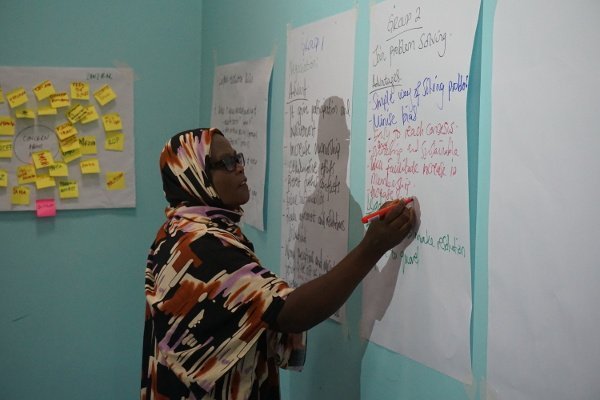Perspectives from a Group Supervisor
Florida Malamba, a former community health group supervisor and programme manager in Malawi, currently uses her experience to provide guidance, advice and training on running groups. She will support Women and Children First with further training across Africa.
She is sharing some of her stories and experiences of working in community health groups.
How would you describe your experiences of being a group supervisor?
“I enjoyed the challenge of accomplishing multiple tasks and handling issues at community, district and national level.
“Most of all, I enjoyed attending group meetings, especially listening to members views during discussions. I give an ear to learn and understand what people’s views are. Experience has taught me that what I know can be just 25% of the knowledge and skills of all the group members.
“Learning and building from their experiences is what I enjoyed the most.”
Do you remember when the group’s work helped someone?
“A pregnant woman used to mock others who were participating in the groups. She used to accuse them of wasting time doing things which are not giving them any profit.
“Her husband did not manage to source enough money for her transport to health facility. When her labour started, she was not able to walk to the hospital. The village had no means of transport, except the groups bicycle ambulance.
“The husband begged group members to borrow their bicycle ambulance. The women allowed him to use it. Soon she arrived at the hospital and delivered a bouncing baby boy.
“From that day she become a prominent member of the group and helped some women in her village to join the group.”
What other experiences, stories or memories do you have from community health groups?
“In the early days it was difficult for groups to implement solutions for reducing maternal and child deaths, because groups were working as individuals. There were no partnerships.
“I came up with bringing group representatives together at every level. This strengthened their efforts. Together members managed to lobby for bicycle ambulances for transportation of patients.
“They established a radio programme with the district health office and the community radio station to disseminate health messages to the wider community.
“They lobbied for treadle pumps used to irrigate vegetable gardens for good nutrition in their homes.”
What is the potential of the groups?
“Setting up health groups empowers communities to take actions on issues that concerns their lives and enhances behaviour change and good practice.
“The most painful thing is women and children are still dying, due to lack of knowledge, cultural beliefs, stereotypes, and poor practices. So many deaths can be prevented. Community health groups penetrate into the underpinning factors of these issues and bring about change.
“Life once lost is gone forever. We still need more support so that maternal and child mortality will be reduced further.”
You have delivered training in Malawi and Tanzania. What were the similarities and differences across the two different countries?
“Groups yield good results where it is being implemented by a local person who is respected, has knowledge of the culture and other community practices as well as having influence in the community.
“While there are language, culture and community differences, the maternal and child health problems raised were almost the same and the contributing factors as well as barriers were similar.
“So, I learnt one thing that Africa is one despite borders and language differences, we are facing similar challenges in health and other social cycles.”
What is the most important lesson you have learnt from across all your group experiences?
“There is power with among community members which just needs to be stirred up.
“Community members have untapped abilities which are fundamental to management and development of their lives as they have the capacity to deal with their social, economic and health well-being.
“The community health group approach enables people to realise their problems, draw solutions and take actions. At the same time, they also assess the impact of their action which gives them direction on next steps.”
What are your biggest hopes and dreams for community health groups now and in the future?
“It is my dream to see groups being established across all districts in Malawi so that maternal and child deaths will be reduced.
“I would like to see groups becoming a centre of action in dealing with different sorts of health problems. They could also be used in dealing with other social issues like climate change, environmental and wildlife preservation, gender inequality and so on.”

